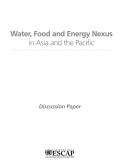This Discussion Paper presents a normative concept of green industrial policy, which is defined as encompassing any policy measure aimed at aligning the structure of a country’s economy with the needs of sustainable development within established planetary boundaries. The paper elaborates on the rationale of a green industrial policy, how it differs from conventional industrial policy, why it is faced with significantly bigger challenges, and how these can be met.
This report was produced by the Decoupling Working Group of the International Resource Panel. It explores technological possibilities and opportunities for both developing and developed countries to accelerate decoupling and reap the environmental and economic benefits of increased resource productivity. It also examines several policy options that have proved to be successful in helping different countries to improve resource productivity in various sectors of their economy, avoiding negative impacts on the environment.
It does not seem possible for a global economy based on the current unsustainable patterns of resource use to continue into the future. The economic consequences of these patterns are already apparent in three areas: increases in resource prices, increased price volatility and disruption of environmental systems. The environment impacts of resource use are also leading to potentially irreversible changes to the world’s ecosystems, often with direct effects on people and the economy – for example through damage to health, water shortages, loss of fish stocks or increased storm damage.
The environmental and health sciences have brought important insights into the connection of environmental pressures and ecosystem damages. Well-known assessments show that habitat change, the overexploitation of renewable resources, climate change, and particulate matter emissions are amongst the most important environmental problems. Biodiversity losses and ill health have been estimated and evaluated.
This report focuses not on the effects of environmental pressure, but on its causes. It describes pressures as resulting from economic activities. These activities are pursued for a purpose, to satisfy consumption. Environmental pressures are commonly tied to the extraction and transformation of materials and energy. This report investigates the production-materials-consumption nexus.

This report describes an evolving policy landscape in Asia and the Pacific characterised by a changing economic reality, rising demand for resources, increasingly apparent impacts of climate change and increased risk and uncertainty. It provides insights into Asian and Pacific resource use trends and outlines key actions that governments can pursue to help bring economic growth strategies in closer alignment with the objective of sustainable development. It also provides examples of strategies for improving resilience to help deal with the increasing levels of risk faced by societies and economies. The report is the product of a combined effort by three institutions: the Asian Development Bank (ADB), the United Nations Economic and Social Commission for Asia and the Pacific (ESCAP) and the United Nations Environment Programme (UNEP).
This summary was prepared by Eldis.
